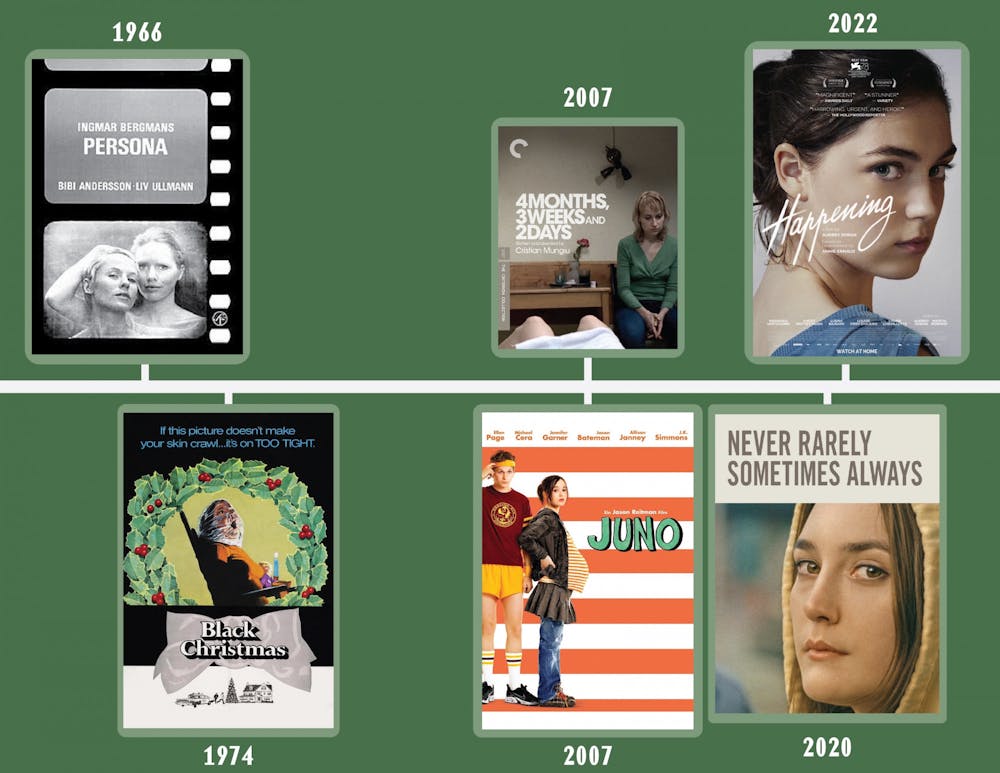Abortion rights became a focal point of national discussion June 24 following the overturn of the original Roe v. Wade decision. However, films have talked about the issue for decades, and the representation of the issue in media is more relevant than ever.
Happening (2021)
A French-language film directed by Audrey Diwan, “Happening,” features a student named Anne in 1963 France who finds out she is pregnant and goes to extreme lengths to try and get an abortion. This was one of the most intimate films of this year and a necessary watch for anyone who cares about the topic.
Diwan’s direction paired with Anamaria Vartolomei’s vulnerable performance as Anne created a film that showed me just how much women can be impacted by abortion, especially with a negative perception.
Anne went through physical and emotional hardships and put her body through torture to abort her baby, all while her family and peers judged her every step of the way. She sought medical professionals for help and even took matters into her hands multiple times, trying to induce an abortion herself knowing she could face prison time.
“Happening” accurately depicted the personal urgency of women who feel the need to save themselves from a dire decision, a powerful example of potential dangers of the criminalization of abortion.
Never Rarely Sometimes Always (2020)
While “Happening” showed how people sought abortions in ‘60s France, “Never Rarely Sometimes” showed how people in the United States might respond to unplanned pregnancy today. The film, directed by Eliza Hittman, centers around two teenage girls, Autumn (Sidney Flanigan) and Skylar (Talia Ryder), who travel from Pennsylvania to New York on an interstate journey for medical attention following an unplanned pregnancy.
While Anne puts herself through physical torture in “Happening,” Autumn puts herself through uncomfortable social situations to find someone who can help her, spending multiple nights in New York with no place to sleep.
“Never Rarely Sometimes Always” also succeeds because of its direction and acting. The film, a slow burn despite only a days-long plot, uses many small details to portray the difficulties faced by Autumn and how she feels in those moments, as extended shots linger on her with an uncomfortable silence to highlight her persistent anxiety.
4 Months, 3 Weeks and 2 Days (2007)
While the aforementioned films focus on the plight of two women who find themselves unexpectedly pregnant, “4 Months, 3 Weeks and 2 Days” revolves around the perspective of a university student, Otilia, with a pregnant roommate.
The Romanian film’s unique point of view shows how the community around whoever seeks an abortion can be affected by the decision. As Otilia helps her roommate deal with the effects of her pregnancy and abortion, the viewer sees Otilia’s own relationship with her boyfriend become strained as a result of an increasingly packed schedule.
However, in this film, the viewer doesn’t feel as emotionally impacted because Otilia isn’t the character going through the abortion, something I felt lessened the emotional impact as the roommate not going through the abortion remains slightly less sympathetic.
Juno (2007)
Many films making a statement on unplanned pregnancy detail the troubles people face while finding an abortion. “Juno,” instead, shows the struggles of a high school girl who becomes pregnant but forgoes an abortion when she sees a classmate protesting outside the abortion clinic.
The classmate’s words about how the fetus has a heartbeat and can feel pain ring true in Juno’s ears as she decides to put the baby up for adoption once it’s born. The film’s light-hearted tone contains enough heart to keep the viewer emotionally invested while making Juno’s struggles easier to digest, as she gets uncomfortable stares and extra attention while at school.
Many films have a grim outlook on unplanned pregnancy, but this film shows what can go right when someone unexpectedly pregnant can rely on a positive support group. Juno’s parents and the child’s father never pressure Juno or make her feel uncomfortable or unwanted because of her situation, something the film shows can drastically change a teen pregnancy.
Black Christmas (1974)
“Black Christmas,” released the year after the original Roe v. Wade decision, works as a landmark film contextualizing the original shift in attitudes.
Jess, the protagonist, finds out she is pregnant and tells her boyfriend the day before an unknown killer begins to stalk her sorority house. The killer repeatedly asks about the baby, and Jess struggles with understanding who is behind the threatening phone calls and her roommates’ murders.
The film freely uses the word abortion without fear of scrutiny, a landmark approach for the ‘70s. The film provides a great sense for the overwhelming feeling some people go through when deciding what to do in the case of an unplanned pregnancy.
Similar to her troubles to avoid the killer and unmask their identity, Jess struggles to understand who she can turn to in the wake of the recent discovery of her pregnancy. The duality of not knowing who is on her side during the slaughter spree or who will support her through her unwanted situation are the plot’s central themes.
Persona (1966)
The Swedish film “Persona” details the story of a nurse, Alma, who cares for actress Elizabet.
Elizabet suddenly stops speaking for personal reasons despite appearing healthy, and the two build a strong relationship and share secrets with each other. Each woman grapples with their own experiences in regards to abortion. Alma, who had an abortion, regrets her decision, while Elizabet underwent a failed abortion and now resents her child.
“Persona” is full of strong symbolism that links the characters together, while the writing shows how distinctly impactful their struggles are. The film opens with a child touching an image of a woman as the face fades in and out, seemingly representing an aborted child trying to understand his mother’s decision.
These films show every woman’s experience is unique if she unexpectedly finds herself pregnant. Elizabet recludes within herself once her operation fails, resentment simmering below the surface, while Alma’s talkative nature offers a stark contrast in their relationship.
Whether they see the result they want, these films indicate that the women who persevere through these turbulent times do so because of their own resolve and support from the people around them.
Contact Kyle Bumpers at kbumpers@alligator.org. Follow him on Twitter @BumpersKyle.
Kyle Bumpers is a fourth-year journalism major and the sports editor of The Alligator. In his free time, he cries about Russell Wilson and writes an outrageous amount of movie reviews on Letterboxd.






